Podcast on Spotify
I. The Jīvanmuktaḥ (continued)
ननु जीवन्मुक्तः कः ?
यथा देहोऽहं पुरुषोऽहं ब्राह्मणोऽहं शूद्रोऽहमस्मीति
दृढनिश्चयस्तथा नाहं ब्राह्मणः न शूद्रः न पुरुषः
किन्तु असंगः सच्चिदानन्द स्वरूपः प्रकाशरूपः सर्वान्तर्यामी
चिदाकाशरूपोऽस्मीति दृढनिश्चय
रूपोऽपरोक्षज्ञानवान् जीवन्मुक्तः ॥ब्रह्मैवाहमस्मीत्यपरोक्षज्ञानेन निखिलकर्मबन्धविनिर्मुक्तः
स्यात् ।
nanu jīvanmuktaḥ kaḥ ?
yathā deho’haṃ puruṣo’haṃ brāhmaṇo’haṃ śūdro’hamasmīti
dṛḍhaniścayastathā nāhaṃ brāhmaṇaḥ na śūdraḥ na puruṣaḥ
kintu asaṃgaḥ saccidānanda svarūpaḥ prakāśarūpaḥ sarvāntaryāmī
cidākāśarūpo’smīti dṛḍhaniścaya
rūpo’parokṣajñānavān jīvanmuktaḥ ..brahmaivāhamasmītyaparokṣajñānena
nikhilakarmabandhavinirmuktaḥ syāt .
Translation
Thus by the words of Vedānta and the teachings of the satguru, those in whom the vision of the truth is born in all beings, are liberated while living (jīvanmuktah).
Then who is a jīvanmuktah? Just as one has firm belief ‘I am the body’; ‘I am a man’, in the same way one who by his immediate knowledge has firmly ascertained, ‘I am not the body’ but ‘I am unattached’ and of the nature of Existence-Consciousness-Bliss, Effulgent, the Indweller of all and the Formless Awareness is a jīvanmuktah. By immediate knowledge that I am Brahman alone, one becomes free from bondage of all karmas.
Who is a jīvanmuktah?
- The jīvanmuktah feels that “I am That Supreme Pure Awareness, I am unattached”, as closely as we feel that we are a man, woman, worker etc.
- Pure Awareness is ever untouched by the changes in the body and mind, just like the contents of the movie do not affect the movie screen.
- The jīvanmuktah is always rooted in Existence (that which does not change in all 3 periods of time), Consciousness (the light that illuminates all objects) and Bliss (inner happiness from which all objects derive happiness).
- The jīvanmuktah has the firm conviction that “I am the Indweller of all, I am beyond space, I reside all bodies which are nothing but names are forms”.
- The jīvanmuktah has the intuitive immediate experience of “I am That Supreme Pure Awareness” which is firm and free of any doubts or erroneous notions.
- The jīvanmuktah has an abiding sense of fulfillment and is free of the impact of karma.
Laws of Karma
- Karma has many meanings. It can mean action, and it can also mean results of action, law of cause and effect, and reincarnation.
- In this context, it means the results of action. For every cause there is an effect, so for every action there is a result that comes to the doer of the action.
- Karma determines our birth, our environment and our lifespan.
- Three laws of karma:
- I am a product of my past actions whose results are manifesting now. If I overeat today, I will get a stomach ache tomorrow.
- I am a master of my future. What I do from now on, I can make things happen or not happen, I have the free will to do so.
- All of my karmas are intertwined. Whatever I think (thoughts), say (speech) or do (actions), can affect many people.
II. Three types of Karma
कर्माणि कतिविधानि सन्तीति चेत्
आगामिसञ्चितप्रारब्धभेदेन त्रिविधानि सन्ति ।
karmāṇi katividhāni santīti cet
āgāmisañcitaprārabdhabhedena trividhāni santi .
Translation
If one is asked: how many kinds of karmas are there, (the reply is) there are three kinds of results of action:, āgāmi (future), sañcita (past) and prārabdha (present).
III. Āgāmi Karma
ज्ञानोत्पत्त्यनन्तरं ज्ञानिदेहकृतं पुण्यपापरूपं कर्म
यदस्ति तदागामीत्यभिधीयते ।
jñānotpattyanantaraṃ jñānidehakṛtaṃ puṇyapāparūpaṃ karma
yadasti tadāgāmītyabhidhīyate .
Translation
The results of actions, good or bad, performed by the body of the realized soul (jnāni) after the dawn of knowledge are called āgāmi.
Explanation
- For the actions that we are doing here and now, the results of actions may fructify either in this life or a future life.
- There is no more sense of individuality for a jīvanmuktah. The sense of ego is falsified. There is no more doership or enjoyership.
- After the rising of knowledge, those actions done by the body of a jīvanmuktah do not affect them. These could be good actions or even bad actions which were unintentional.
IV. Sañcita Karma
सञ्चितं कर्म किम् ?
अनन्तकोटिजन्मनां बीजभूतं सत् यत्कर्मजातं पूर्वार्जितं
तिष्ठति तत् सञ्चितं ज्ञेयम् ।
sañcitaṃ karma kim ?
anantakoṭijanmanāṃ bījabhūtaṃ sat yatkarmajātaṃ pūrvārjitaṃ
tiṣṭhati tat sañcitaṃ jñeyam .
Translation
The result of actions performed in (all) previous births which are in seed form to give rise to endless millions of births in future is called Sañcita (accumulated) karma.

